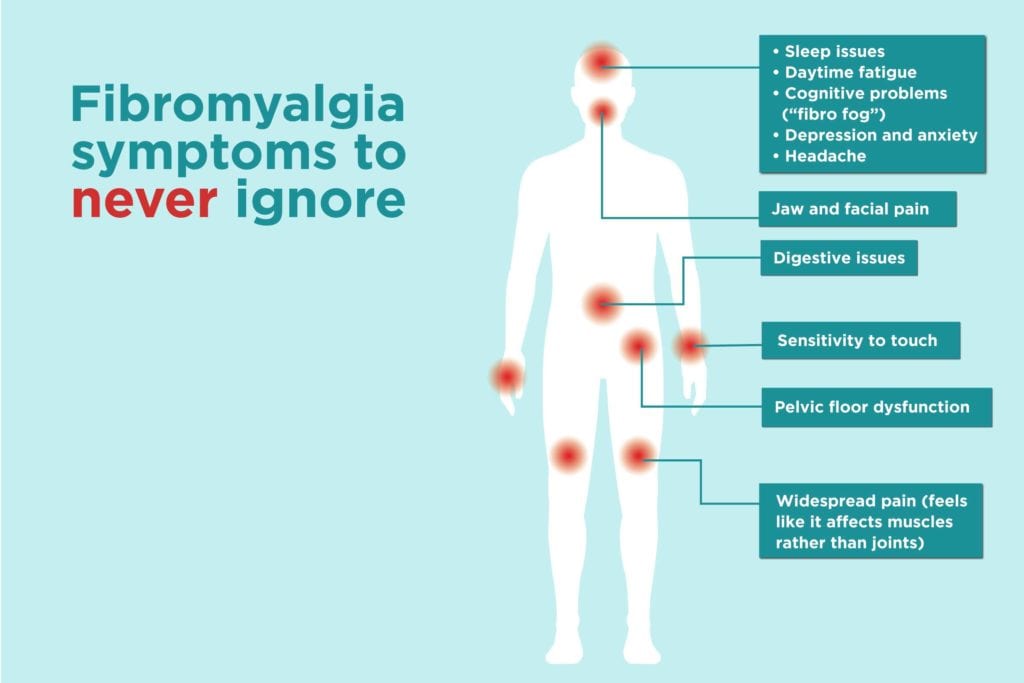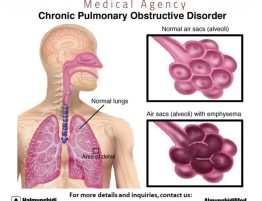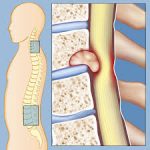
Fibromyalgia, also called fibromyalgia syndrome (FMS), is a long-term condition that causes pain all over the body.
Fibromyalgia is the second most common condition affecting the bones and muscles. Yet it’s often misdiagnosed and misunderstood. Its classic symptoms are widespread muscle and joint pain and fatigue.
Fibromyalgia can feel similar to osteoarthritis, bursitis, and tendinis. But rather than hurting in a specific area, the pain and stiffness could be throughout the body.
Signs and symptoms of Fibromyalgia
- Increased sensitivity to pain
- Fatigue (extreme tiredness)
- Muscle stiffness
- Difficulty sleeping
- Problems with mental processes (known as “fibro-fog) – such as problems with memory and concentration
- Headaches
- Irritable bowel syndrome (IBS) – a digestive condition that causes stomach pain and bloating
Risks and Causes
Doctors aren’t sure what causes it, but some think it’s a problem with how the brain and spinal cord process pain signals from the nerves.
Certain things suggest that someone is more likely to get it such as:
- Being a woman
- Having another painful disease, such as, arthritis, or an infection
- Having a mood disorder, like anxiety or depression
- History of being physically or emotionally abused or have PTSD
- Rarely exercising
- Having other family members with fibromyalgia
Diagnosis
There’s no test that can tell a person they have fibromyalgia. Instead, because the symptoms are so similar to other conditions, the doctor will rule out illnesses such as underactive thyroid, different types of arthritis, and lupus. So they may get blood tests to check hormone levels and signs of inflammation, as well as X-rays.
If the doctor can’t find another reason for how the patient feels, they’ll use a two-part scoring system to measure how widespread the pain has been and how much the symptoms affect the daily life. Using those results, together they’ll come up with a plan to manage the condition.
Treatments
In general, treatments for fibromyalgia include both medication and self-care. The emphasis is on minimizing symptoms and improving general health. No one treatment works for all symptoms.
Medications – medications can help reduce the pain of fibromyalgia and improve sleep. Common choices include:
- Pain relievers – over-the-counter pain relievers such as acetaminophen (Tylenol, others). Ibuprofen (Advil, Motrin IB, others) or naproxen sodium (Aleve, others) may be helpful.
- Antidepressants – duloxetine (Cymbalta) and milnacipran (savella) may help ease the pain and fatigue associated with fibromyalgia.
- Anti-seizure drugs – medications designed to treat epilepsy are often useful in reducing certain types of pain.
Therapy – a variety of different therapies can help reduce the effect that fibromyalgia has on the body and the life. Examples include:
- Physical therapy – a physical therapist can teach exercises that will improve the strength, flexibility and stamina. water-based exercises might be particularly helpful
- Occupational therapy – an occupational therapist can help make adjustments to the work area or the way the patient perform certain tasks that will cause less stress in the body
- Counseling – talking with a counselor can help strengthen the belief in abilities and teach strategies for dealing with stressful situations
Because many of the signs and symptoms of fibromyalgia are similar to various other disorders, you may see several doctors before receiving a diagnosis. Your family physician may refer you to a doctor who specializes in the treatment of arthritis and other similar conditions (rheumatologist).
What We Offer
We at Almurshidi Medical Tourism will find the best doctors to cater to your needs. We are partnered with a wide network of hospitals and clinics that provide top quality medical experience.
We provide free medical estimates, make medical appointments, and provide several medical opinions if needed at no cost.
Contact Us
For more information contact us at +66822004040 or via WhatsApp








